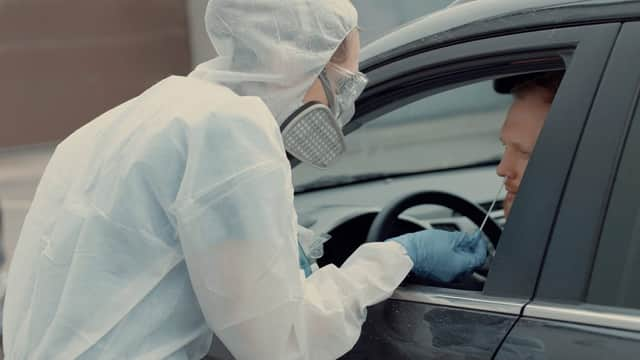Here’s why you might be struggling to get a coronavirus test


Over the past few weeks, stories of people struggling to get tested for coronavirus have emerged across the country.
Over the past few weeks, stories of people struggling to get tested for coronavirus have emerged across the country.
Advertisement
Hide AdAdvertisement
Hide AdMany people with symptoms are reporting being asked to travel hundreds of miles for testing, or are simply unable to get a test at all.
There are a few explanations as to why this is happening - here’s what you need to know.
Surge in coronavirus cases and test demand
Coronavirus cases have risen sharply in the past few weeks, leading to new restrictions being imposed on gatherings in England
This rise in cases has led to a higher demand for tests across the country.
Advertisement
Hide AdAdvertisement
Hide AdOver the summer, Baroness Harding, who runs NHS Test and Trace said that the main obstacle to having control of the disease was that not enough people were coming forward to get tested.
As a result, the government started a nationwide campaign urging people to get tested - and this may have contributed to high numbers of people wanting tests currently.
A source from NHS Test and Trace told ITV journalist Robert Peston:
"Demand for testing has gone through the roof. It’s almost like the loo roll phenomenon early on in the year."
Problems with processing tests
Advertisement
Hide AdAdvertisement
Hide AdSarah-Jane Marsh, one of the directors of the government's test and trace programme in England, recently apologised for the lack of tests available to the public.
She said that it was not the testing sites themselves but the laboratories which were “the critical pinch point”.
While testing sites have capacity, it’s the ability of laboratories to process tests that is causing major delays in the system.
Health secretary Matt Hancock admitted there has been “a problem with a couple of contracts” which would take some weeks to be “sorted in the short term”.
Asymptomatic people getting tests
Advertisement
Hide AdAdvertisement
Hide AdHowever, the health secretary has also pointed the finger at people with asymptomatic cases as one of the reasons for testing shortages.
He has claimed that around 25 per cent of people getting tested do not have symptoms - and that this demand is placing pressure on the system, meaning people with symptoms are unable to access a test.
The Department of Health and Social Care has insisted that the NHS Test and Trace system is “working”, with capacity currently the “highest it’s ever been”.
A spokeswoman told the BBC there was "significant demand" for tests but new slots and home testing kits were "made available daily".
Advertisement
Hide AdAdvertisement
Hide Ad"We are targeting testing capacity at the areas that need it most, including those where there is an outbreak, as well as prioritising at-risk groups - and we recently announced new laboratory facilities and new technology to process results even faster," she said.
A version of this article originally appeared on our sister title, The Yorkshire Evening Post.